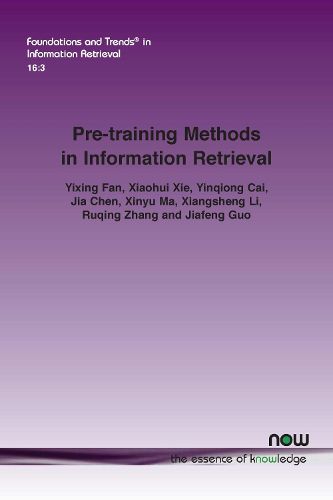Readings Newsletter
Become a Readings Member to make your shopping experience even easier.
Sign in or sign up for free!
You’re not far away from qualifying for FREE standard shipping within Australia
You’ve qualified for FREE standard shipping within Australia
The cart is loading…






This title is printed to order. This book may have been self-published. If so, we cannot guarantee the quality of the content. In the main most books will have gone through the editing process however some may not. We therefore suggest that you be aware of this before ordering this book. If in doubt check either the author or publisher’s details as we are unable to accept any returns unless they are faulty. Please contact us if you have any questions.
Information retrieval (IR) is a fundamental task in many real-world applications such as Web search, question answering systems, and digital libraries. The core of IR is to identify information resources relevant to user’s information need. Since there might be more than one relevant resource, the returned result is often organized as a ranked list of documents according to their relevance degree against the information need. The ranking property of IR makes it different from other tasks, and researchers have devoted substantial efforts to develop a variety of ranking models in IR.
In recent years, the resurgence of deep learning has greatly advanced this field and led to a hot topic named NeuIR (neural information retrieval), especially the paradigm of pre-training methods (PTMs). Owing to sophisticated pre-training objectives and huge model size, pre-trained models can learn universal language representations from massive textual data that are beneficial to the ranking task of IR. Considering the rapid progress of this direction, this survey provides a systematic review of PTMs in IR. The authors present an overview of PTMs applied in different components of an IR system, including the retrieval component and the re-ranking component. In addition, they introduce PTMs specifically designed for IR, and summarize available datasets as well as benchmark leaderboards. Lastly, they discuss some open challenges and highlight several promising directions with the hope of inspiring and facilitating more works on these topics for future research.
$9.00 standard shipping within Australia
FREE standard shipping within Australia for orders over $100.00
Express & International shipping calculated at checkout
Stock availability can be subject to change without notice. We recommend calling the shop or contacting our online team to check availability of low stock items. Please see our Shopping Online page for more details.
This title is printed to order. This book may have been self-published. If so, we cannot guarantee the quality of the content. In the main most books will have gone through the editing process however some may not. We therefore suggest that you be aware of this before ordering this book. If in doubt check either the author or publisher’s details as we are unable to accept any returns unless they are faulty. Please contact us if you have any questions.
Information retrieval (IR) is a fundamental task in many real-world applications such as Web search, question answering systems, and digital libraries. The core of IR is to identify information resources relevant to user’s information need. Since there might be more than one relevant resource, the returned result is often organized as a ranked list of documents according to their relevance degree against the information need. The ranking property of IR makes it different from other tasks, and researchers have devoted substantial efforts to develop a variety of ranking models in IR.
In recent years, the resurgence of deep learning has greatly advanced this field and led to a hot topic named NeuIR (neural information retrieval), especially the paradigm of pre-training methods (PTMs). Owing to sophisticated pre-training objectives and huge model size, pre-trained models can learn universal language representations from massive textual data that are beneficial to the ranking task of IR. Considering the rapid progress of this direction, this survey provides a systematic review of PTMs in IR. The authors present an overview of PTMs applied in different components of an IR system, including the retrieval component and the re-ranking component. In addition, they introduce PTMs specifically designed for IR, and summarize available datasets as well as benchmark leaderboards. Lastly, they discuss some open challenges and highlight several promising directions with the hope of inspiring and facilitating more works on these topics for future research.